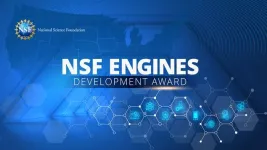(Press-News.org) Modern-day society relies intrinsically on automated systems and artificial intelligence. It is embedded into our daily routines and shows no signs of slowing, in fact use of robotic and automated assistance is ever-increasing.
Such pervasive use of AI presents technologists and developers with two ethical dilemmas – how do we build robots that behave in line with our values and how to we stop them going rogue?
One author suggests that one option which is not explored enough is to code more humanity into robots, gifting robots with traits such as empathy and compassion.
Is humanity the answer?
In a new book called Robot Souls, publishing in August, writer and academic Dr Eve Poole OBE explores the idea that the solution to society’s conundrum about how to make sure AI is ethical lies in human nature.
She argues that in its bid for perfection, humans stripped out the ‘junk code’ including emotions, free will and a sense of purpose.
She said: “It is this ‘junk’ which is at the heart of humanity. Our junk code consists of human emotions, our propensity for mistakes, our inclination to tell stories, our uncanny sixth sense, our capacity to cope with uncertainty, an unshakeable sense of our own free will, and our ability to see meaning in the world around us.
“This junk code is in fact vital to human flourishing, because behind all of these flaky and whimsical properties lies a coordinated attempt to keep our species safe. Together they act as a range of ameliorators with a common theme: they keep us in community so that there is safety in numbers.”
Robot souls
With AI increasingly taking up more decision-making roles in our daily lives, along with rising concerns about bias and discrimination in AI, Dr Poole argues the answer might be in the stuff we tried to strip out of autonomous machines in the first place.
She said: “If we can decipher that code, the part that makes us all want to survive and thrive together as a species, we can share it with the machines. Giving them to all intents and purposes a ‘soul’.”
In the new book, Poole suggests a series of next steps to make this a reality, including agreeing a rigorous regulation process, and an immediate ban on autonomous weapons along with a licensing regime with rules that reserve any final decision over the life and death of a human to a fellow human.
She argues we should also agree the criteria for legal personhood and a road map for Al towards it.
The human blueprint
“Because humans are flawed we disregarded a lot of characteristics when we built AI,” Poole explains. “It was assumed that robots with features like emotions and intuition, that made mistakes and looked for meaning and purpose, would not work as well.
“But on considering why all these irrational properties are there, it seems that they emerge from the source-code of soul. Because it is actually this ‘junk’ code that makes us human and promotes the kind of reciprocal altruism that keeps humanity alive and thriving.”
Robot Souls looks at developments in AI and reviews the emergence of ideas of consciousness and the soul.
It places our ‘junk code’ in this context and argues that it is time to foreground that code, and to use it to look again at how we are programming AI.
END
Should robots be given a human conscience?
Humans have curated the best of human intelligence to inform AI, with the hopes of creating flawless machines – but could the flaws we left out be the missing pieces needed to ensure robots do not go rogue?
2023-06-12
ELSE PRESS RELEASES FROM THIS DATE:
Research brings hope for early treatment of brain degeneration in ‘children of the night’
2023-06-12
Glasgow, UK: Xeroderma pigmentosum (XP) is a rare and devastating genetic disorder characterised by an inability to repair skin damage caused by ultraviolet (UV) light. As a result, patients with XP develop skin cancers, usually in childhood. Once diagnosed, they can be protected by avoiding sunlight (hence sometimes being called ‘children of the night’), wearing special clothing and sunglasses, and using sunscreen. But some will also develop neurodegenerative conditions such as hearing loss, loss of intellectual function, poor co-ordination and seizures. Finding out why this is, and which ...
Polygenic risk scores could improve colorectal cancer screening
2023-06-12
Glasgow, UK: Rates of colorectal cancer are high despite widespread adoption of screening programmes in many high-income European countries. Such programmes tend to use a one-size-fits-all approach where most people are screened starting from the same age, and no individual factors are considered in organised population screening. Now, based on one of the largest genomics studies on the topic to date, researchers from Finland have outlined how common genetic factors could be used to identify individuals at high risk of developing the disease and hence improve current colorectal screening strategies.
Max Tamlander, MD at the Institute ...
Results from first randomised controlled trial of genetic counselling for familial and inherited colorectal cancer show significant improvements in patient empowerment
2023-06-11
Glasgow, UK: Genetic counselling is essential when dealing with individuals who are affected by, or at risk of, inherited disease. Although it is known to be useful in helping patients cope with test results and deal with uncertainty, there have been very few randomised controlled trials (RCTs) of its effectiveness. Dr Andrada Ciuca, a post-doctoral researcher at Babes-Bolyai University, Cluj-Napoca, Romania, will tell the annual conference today (Sunday 11 June) that the results of the first RCT of genetic counselling in familial colorectal cancer (fCRC) show that it provided significant ...
Blood biomarkers plus genomics predict common disease risk more accurately than genomic information alone
2023-06-10
Glasgow, UK: Being to identify people at high risk of chronic disease means that they can be targeted with prevention measures before they become sick. Polygenic risk scores, where genomic information alone is used to assess the risk of developing diseases, have been receiving a lot of attention recently, but research to be presented at the annual conference of the European Society of Human Genetics today (Saturday 10 June) suggests that combining blood biomarkers with genomic information gives more accurate, cost-effective results.
Dr Jeffrey Barrett, Chief Scientific Officer, Nightingale Health, Helsinki, ...
The use of AI in eye scans helps improve diagnosis of inherited disease of the retina
2023-06-10
Glasgow, UK: Inherited retinal diseases (IRDs), single-gene disorders affecting the retina, are very difficult to diagnose since they are uncommon and involve changes in one of many candidate genes. Outside specialist centres, there are few experts who have adequate knowledge of these diseases, and this makes it difficult for patients to access proper testing and diagnosis. But now, researchers from the UK and Germany have used artificial intelligence (AI) to develop a system that they believe will enable more widespread provision of testing, together with improved efficiency.
Dr ...
University of Tennessee, Knoxville, partners on multi-university NSF Engines Development Award
2023-06-09
The University of Tennessee, Knoxville, is partnering with other Southeastern universities in a coalition exploring methods for driving U.S. economic competitiveness. The initiative is supported by a two-year, Type 1 Development Award worth $1 million, funded by the National Science Foundation’s (NSF) Regional Innovation Engines. The team was one of only 44 out of 497 Type-1 applications the NSF funded, marking the first time the NSF has distributed Regional Innovation Engines grants.
Thomas Goldsby, Dee and Jimmy Haslam Chair in Logistics at UT’s Haslam College of Business Department of Supply Chain Management, ...
The future of industrial chemicals: OU engineers seek more efficient processes
2023-06-09
A study by a team of University of Oklahoma researchers has been featured in Cell Reports Physical Science, an open-access journal highlighting cutting-edge research in the physical sciences.
The study, “Cooperative roles of water and metal-support interfaces in the selective hydrogenation of cinnamaldehyde over cobalt boride catalysts,” explores the role of water in the selective hydrogenation of carbonyl over alkene bonds. Utilizing cobalt and cobalt boride catalysts, OU researchers analyzed the hydrogenation ...
Jiu Jitsu club stage physical assaults to help advance forensic research
2023-06-09
Researchers from Northumbria University and King’s College London have published findings outlining the extent that textile fibres transfer during controlled assault scenarios.
Their work, recently published in the academic journal Science & Justice, is the first time the number of fibres transferred between garments during physical assaults has been assessed by simulating the act with real people through Northumbria University’s Jiu Jitsu club.
Dr Kelly Sheridan, Assistant Professor of Forensic Science in Northumbria’s Department of Applied Sciences, believes the findings will ...
University of Chicago mathematician Vladimir Drinfeld wins prestigious Shaw Prize
2023-06-09
Vladimir Drinfeld, the Harry Pratt Judson Distinguished Service Professor of Mathematics at the University of Chicago, is one of two recipients of the prestigious Shaw Prize in Mathematical Sciences for 2023.
He shares this year’s honor jointly with Shing-Tung Yau of Tsinghua University for their “contributions related to mathematical physics, to arithmetic geometry, to differential geometry and to Kähler geometry.”
The Shaw Prize honors individuals who have recently achieved distinguished and significant advances in the fields of astronomy, life science and medicine, and mathematical sciences. Each category carries a monetary award of ...
Similar symptoms, biological abnormalities underlie long COVID and chronic fatigue syndrome
2023-06-09
Long COVID and myalgic encephalomyelitis/chronic fatigue syndrome are debilitating conditions with similar symptoms. Neither condition has diagnostic tests or treatments approved by the Food and Drug Administration (FDA) and each cost the United States billions of dollars each year in direct medical expenses and lost productivity. Doctors and researchers have wondered what are the underlying biological abnormalities that may cause symptoms, and whether these abnormalities are similar in the two illnesses.
A review article authored by senior investigators at Brigham and Women’s Hospital and Harvard Medical School, and the Mailman School of Public Health and Vagelos ...
LAST 30 PRESS RELEASES:
Scientists discover why we know when to stop scratching an itch
A hidden reason inner ear cells die – and what it means for preventing hearing loss
Researchers discover how tuberculosis bacteria use a “stealth” mechanism to evade the immune system
New microscopy technique lets scientists see cells in unprecedented detail and color
Sometimes less is more: Scientists rethink how to pack medicine into tiny delivery capsules
Scientists build low-cost microscope to study living cells in zero gravity
The Biophysical Journal names Denis V. Titov the 2025 Paper of the Year-Early Career Investigator awardee
Scientists show how your body senses cold—and why menthol feels cool
Scientists deliver new molecule for getting DNA into cells
Study reveals insights about brain regions linked to OCD, informing potential treatments
Does ocean saltiness influence El Niño?
2026 Young Investigators: ONR celebrates new talent tackling warfighter challenges
Genetics help explain who gets the ‘telltale tingle’ from music, art and literature
Many Americans misunderstand medical aid in dying laws
Researchers publish landmark infectious disease study in ‘Science’
New NSF award supports innovative role-playing game approach to strengthening research security in academia
Kumar named to ACMA Emerging Leaders Program for 2026
AI language models could transform aquatic environmental risk assessment
New isotope tools reveal hidden pathways reshaping the global nitrogen cycle
Study reveals how antibiotic structure controls removal from water using biochar
Why chronic pain lasts longer in women: Immune cells offer clues
Toxic exposure creates epigenetic disease risk over 20 generations
More time spent on social media linked to steroid use intentions among boys and men
New study suggests a “kick it while it’s down” approach to cancer treatment could improve cure rates
Milken Institute, Ann Theodore Foundation launch new grant to support clinical trial for potential sarcoidosis treatment
New strategies boost effectiveness of CAR-NK therapy against cancer
Study: Adolescent cannabis use linked to doubling risk of psychotic and bipolar disorders
Invisible harms: drug-related deaths spike after hurricanes and tropical storms
Adolescent cannabis use and risk of psychotic, bipolar, depressive, and anxiety disorders
Anxiety, depression, and care barriers in adults with intellectual and developmental disabilities
[Press-News.org] Should robots be given a human conscience?Humans have curated the best of human intelligence to inform AI, with the hopes of creating flawless machines – but could the flaws we left out be the missing pieces needed to ensure robots do not go rogue?



